|
|
|
Sort Order |
|
|
|
Items / Page
|
|
|
|
|
|
|
| Srl | Item |
| 1 |
ID:
176452
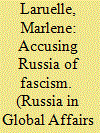

|
|
|
| 2 |
ID:
081257
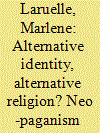

|
|
|
|
|
| Publication |
2008.
|
| Summary/Abstract |
As in all post-Soviet states, the Russian intelligentsia has been preoccupied with the construction of a new national identity since the beginning of the 1990s. Although the place of Orthodox religion in Russia is well documented, the subject of neo-paganism and its consequent assertion of an Aryan identity for Russians remains little known. Yet specialists observing the political and intellectual life of contemporary Russia have begun to notice that the development of references to 'Slavic paganism' and to Russia's 'Aryan' origin can be found in the public speeches of some politicians and intellectual figures. This article will attempt, in its first section, to depict the historical depth of these movements by examining the existence of neo-pagan and/or Aryan referents in Soviet culture, and focusing on how these discourses developed in different spheres of post-Soviet Russian society, such as those of religion, historiography, and politics
|
|
|
|
|
|
|
|
|
|
|
|
|
|
|
|
| 3 |
ID:
164513
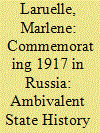

|
|
|
|
|
| Summary/Abstract |
Russia’s historical policy towards the centenary of 1917 was composed of several parallel strategies: diminishing the meaning of the event to avoid the head of state and other government figures having to take a stance; outsourcing commemorative events, with no pre-planned grand design; developing a reconciliatory narrative of the ‘Whites’ and the ‘Reds’; and allowing other actors to promote a plurality of contradictory readings of the events. Yet the space left by the state’s refusal to commemorate 1917 has been taken over by the Church, which, as today’s most active engineer of Russia’s historical policy, promoted a very clear pro-Tsarist narrative best embodied by the multimedia historical park ‘Russia—my history’ (Rossiya—moya istoriya).
|
|
|
|
|
|
|
|
|
|
|
|
|
|
|
|
| 4 |
ID:
152139
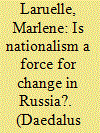

|
|
|
|
|
| Summary/Abstract |
This essay defines three categories of Russian nationalist actors: nonstate actors, whose agenda is anti-Putin; parastate actors, who have their own ideological niche, not always in tune with the presidential administration's narrative, but who operate under the state umbrella; and state actors, in particular, the presidential administration. In the future, the Russian ethnonationalism embodied by nonstate actors is the main trend that could pose a serious threat to the regime. However, the Kremlin is not “frozen” in terms of ideology, and its flexibility allows it to adapt to evolving situations. One of the most plausible scenarios is the rise of a figure inside the establishment who would be able to prevent the polarization of Russian nationalism into an antiregime narrative and could co-opt some of its slogans and leaders, in order to gradually channel the official narrative toward a more state-controlled nationalism.
|
|
|
|
|
|
|
|
|
|
|
|
|
|
|
|
| 5 |
ID:
165966
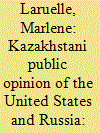

|
|
|
|
|
| Summary/Abstract |
Though Central Asia is often studied through the prism of its relationships with external powers, research on local public perceptions of these different actors has largely been overlooked. The literature on Kazakhstanis’ perceptions of their neighbours, for instance, is scarce, and mostly focused on analysis of official discourse on Kazakhstan’s multi-vector policy, with little exploration of how this is received, appropriated or refuted by the population. On the basis of Gallup data spanning the last decade, and several other surveys, we test most of the main hypotheses usually advanced to explain attitudes to the US and Russia – age, ethnicity and access to information – and draw five main conclusions: (1) Kazakhstanis are not defined by an exclusive pro-US/pro-Russian dichotomy; (2) they nevertheless largely choose Russia over the US if forced to pick; (3) age does not have a significant effect on foreign policy attitudes; (4) ethnicity does affect some of the attitudes under consideration, but its effects are not large enough to produce markedly different opinions among ethnic Kazakhs and ethnic Russians in aggregate; and (5) consumption of media from Russia and access to non-governmental and Western sources of information do not seem to have significant effects on the attitudes under consideration.
|
|
|
|
|
|
|
|
|
|
|
|
|
|
|
|
| 6 |
ID:
137473
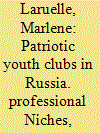

|
|
|
|
|
| Summary/Abstract |
Youth civic engagement in post-socialist countries and youth enrolment in defending the current regimes or contesting them became a growing topic of research in the 2000s. This essay examines a category of largely under-studied youth social engagement in Russia: patriotic clubs for children, teenagers and young adults. These clubs do not come close to the stereotypes promoted by the state patriotic education programmes. There is a major gap between the activists' patriotic narratives and practices, and those expected by the Kremlin. The first part of the paper investigates the notion of ‘patriotic club’ as a broad umbrella that covers multiple activities and practices. Then it explores their meanings and three of their main functions, as a professional tool on the job market, a source of cultural capital, and a way to develop a depoliticised social engagement.
|
|
|
|
|
|
|
|
|
|
|
|
|
|
|
|
| 7 |
ID:
135223
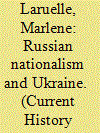

|
|
|
|
|
| Summary/Abstract |
Russia has openly questioned the legitimacy of the international system, claiming the right to a distinctive sovereignty that makes the protection of its cultural body abroad a moral duty. Second in a series on resurgent nationalism around the world.
|
|
|
|
|
|
|
|
|
|
|
|
|
|
|
|
| 8 |
ID:
181725
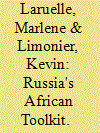

|
|
|
|
|
| Summary/Abstract |
Today, Russian influence on the African continent is still anecdotic compared to the People's Republic of China, the United States, and former colonial powers, such as France. Yet, Moscow has committed to reasserting itself as an alternative pole of influence to China and Western countries in the eyes of some African elites. This article analyzes two key components of Russia's African toolkit: its media outlets such as RT and Sputnik, which have managed to impose themselves on the African media landscape, and its entrepreneurs of influence, in charge of influence campaigns of different scopes. The article contends that Russia's media success relies more on the appropriation of its informational content by African actors with their own political agendas than on Moscow convincing African audiences of the legitimacy of its foreign policy or political model, and that entrepreneurs of influence may play a useful, but limited, role in testing new parameters of influence.
|
|
|
|
|
|
|
|
|
|
|
|
|
|
|
|
| 9 |
ID:
130368
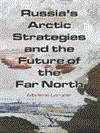

|
|
|
|
|
| Publication |
New York, M E Sharpe Inc, 2014.
|
| Description |
xxvi, 251p.Pbk
|
| Standard Number |
9780765635013
|
|
|
|
|
|
|
|
|
|
|
|
Copies: C:1/I:0,R:0,Q:0
Circulation
| Accession# | Call# | Current Location | Status | Policy | Location |
| 057734 | 320.609471/LAR 057734 | Main | On Shelf | General | |
|
|
|
|
| 10 |
ID:
189041
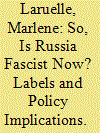

|
|
|
|
|
| Summary/Abstract |
Russia’s horrific war in Ukraine has sharply revived debate over charges of Russia’s fascist behavior. The most vocal voices in this debate are Yale historian Timothy Snyder, who has proclaimed that “Putin’s regime … is the world center of fascism,” and authored an op-ed in The New York Times entitled “We Should Say It: Russia Is Fascist.”Footnote1 Similar arguments are advanced by Rutgers political scientist Alexander Motyl, who asserted in a recent piece that Russia fits the textbook definition of fascism.Footnote2 State leaders currently fighting against Russia share that view: Ukrainian president Volodymyr Zelensky has labelled Russia’s actions as fascist and drawn parallels between Putin’s Russia and Nazi Germany.Footnote3 Polish President Andrzej Duda followed suit, stating that “today Russian leaders are behaving in exactly the same way, like Hitler, like the German SS, like the German pilots of the fascist army during World War II.”Footnote4 Among Russian social scientists abroad as well as those courageously resisting at home, the debate about Russia’s "fascism" has also become central in discussing post-February 24 transformations, most of them concluding that Russia does not (yet?) fit the typology.
|
|
|
|
|
|
|
|
|
|
|
|
|
|
|
|
| 11 |
ID:
104453
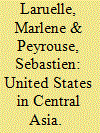

|
|
|
|
|
| Publication |
2011.
|
| Summary/Abstract |
This article focuses on the evolving place of the US in the Central Asian arena, analysing how US interests have changed in this region since the 1990s. It studies how strategic relations were transformed around the NATO Partnership for Peace, the growing cooperation in the Caspian Sea, and the building of a regional security architecture surrounding Afghanistan. It also analyses Washington's difficulties in promoting 'civil society' and the limits of the US economic engagement in the region. It concludes that the United States must show more interest in societal development, and demonstrate its willingness to respond to Central Asian needs and perspectives.
|
|
|
|
|
|
|
|
|
|
|
|
|
|
|
|
| 12 |
ID:
137472
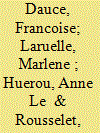

|
|
|
|
|
|
|
|